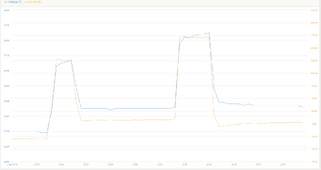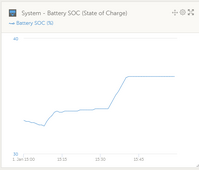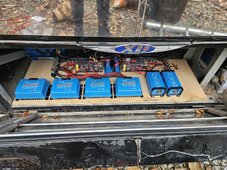Justin, thx for the reply with good info, I think I inderstand more now.
So, you have two separate battery systems, both charging off same alternator. A 12v battery system being charged up by a 24 12 dcdc Victron Orion, and a 48v battery system being charged up by four separate 24 48 8.5A dcdc Victron Orions.
So, each 24 48 Orion can do 400w max, 8.5A at 48v nominal. That is a total of 1600w to go into 48v battery bank.
I can't tell what your 24 12 dcdc amperage is, but am going to guess their 24 12 30A, with 360w max.
Here is what is probably happening. Go here to download the Victron Orion spec sheets to see this info in person:
Provide a stable DC output voltage using the, easy to install, Orion DC-DC Inverter from Victron Energy. Find a dealer near you.

www.victronenergy.com
Lets look at the 24 12 30A converter, the 24 48 8.5A is in same table and similar. Those dcdc convertors have an input voltage range 20-35v, and a setable output voltage range. They also shut down if the input voltage from alternator is below 14v, then restart when input voltage from alternator goes above 15v. Their nominal output voltage is 12.2v, but can be adjusted from 10-15v.
BUT HERE IS THE PROBLEM. There is a note by Victron for if you adjust input or output voltages, which you did:
"If the output voltage is set higher than nominal by a certain percentage, the minimum input voltage at which the output voltage remains stable (does not decrease) increases by the same percentage"
This "remains stable" means minimum input voltage is met and it doesn't shut down!
So, if you have the output voltage "cranked all the way up" as you said, that is 15v instead of nominal 12.2v, so 123%. It says the min input voltage now increase from 14v to 17.2v!
So, your alternator is probably a smart alternator? At idle it probably drops output voltage, most do, probably drives voltage below the min input voltage with nominal settings, so the charger shuts down and doesnt charge, waiting for you to rev the engine up and alternator gets above the restart trigger. With output cranked up to 15v, the thing shuts down when input is below 17.2v, probably restarts above 18.2v.
The 24 48 8.5A converters likewise:
same 14v min input cutoff, output nominal 48.2v but adjustable to 60. Which I think you said you set 56? In any case, that gives same 17v min input from alternator to turn converters off, and wake back at 18v.
You are demanding from alternator probably 1600w via 48v system (four 400w converters), plus 360 from 12v system, for 1960w. That is a ton!
I don't know what your alternator is, which is the critical piece of info here needed. is this the single alternator used for motor?
However, alternators only supply 50% or less rated power at idle, and can only supply your batteries power in excess of what your van is already using, which is normally like 50% of rated. And alternators can't run at 80-100% rated power for long before they get hot, and then the smart function DROPS THEIR VOLTAGE OUTPUT TO PROTECT ALTERNATOR UNTIL COOL.
So, I would guess you are having an overloaded alternator issue. My 12v 130A alternator can only do 1800w at peak for a short while, and can only do 1000w total in idle, of which only 300w or so is available after truck engine and airco use! If you are demanding 1960w from your alternator, then it would likely need to be rated at 4500w or something to deliver, without overheating or curtailing voltage and thus shutting down your chargers. So a 320A 12v alternator, or 180A 24v or such?
So, I recommend measuring the alternator output voltage and see what is going on there, and also measure the dcdc input voltage (which should be the alternator output) and then their output voltage, to see if they are cutting out.





